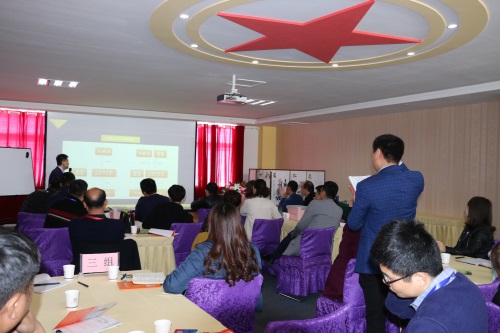
济南餐饮企业股权激励的实操难点:从“纸上方案”到“落地执行”的荆棘之路
发布时间:2025-05-19 来源:http://www.lushangyun.com/
在餐饮行业竞争白热化的今天,股权激励已成为企业绑定人才、激发活力的“标配动作”。然而,从方案设计到落地执行,济南餐饮企业正面临一系列“隐性门槛”——地域文化、行业特性与员工心理的交织,让股权激励远非“分股权”这般简单。
In today's fiercely competitive catering industry, equity incentives have become a "standard action" for enterprises to bind talents and stimulate vitality. However, from the design of the plan to its implementation, Jinan catering enterprises are facing a series of "hidden thresholds" - the interweaving of regional culture, industry characteristics, and employee psychology, making equity incentives far more than just "dividing shares".
难点一:行业特性与股权价值的“认知错位”
Difficulty One: "Cognitive Misalignment" between Industry Characteristics and Equity Value
餐饮行业“三高一低”(房租高、人力成本高、食材成本高、毛利低)的特性,让员工对股权的“长期价值”缺乏信任:
The characteristics of the catering industry's "three highs and one low" (high rent, high labor costs, high food costs, and low gross profit) make employees lack trust in the "long-term value" of equity:
流动性困局:服务员、厨师等岗位年均离职率超30%,员工更倾向“现金为王”,而非“画饼充饥”。
Liquidity dilemma: The average annual turnover rate for positions such as waiters and chefs exceeds 30%, and employees tend to prioritize cash over empty promises.
估值模糊性:单店模型复杂、连锁化率低,导致股权估值缺乏“市场标尺”,员工质疑“分到的股权值多少钱”。
Valuation ambiguity: The complex single store model and low chain rate lead to a lack of "market standards" for equity valuation, and employees question the value of the equity they receive.
退出机制缺失:未约定股权回购条款,员工离职时易因股权处置引发纠纷。
Lack of exit mechanism: There is no agreed upon equity repurchase clause, which makes it easy for disputes to arise due to equity disposal when employees resign.
难点二:地域文化与激励逻辑的“隐性冲突”
Difficulty 2: The Hidden Conflict between Regional Culture and Incentive Logic
济南作为儒家文化发源地之一,“不患寡而患不均”的观念深入人心,股权激励需兼顾“公平”与“效率”:
As one of the birthplaces of Confucian culture, Jinan has deeply rooted the concept of "not worrying about scarcity but about inequality", and equity incentives need to balance "fairness" and "efficiency":
平均主义倾向:员工期待“人人有份”,但股权激励需聚焦核心岗位(如店长、厨师长),易引发“为什么他没有”的质疑。
Equalization tendency: Employees expect "everyone has a share", but equity incentives need to focus on core positions (such as store managers and chefs), which can easily lead to questioning of "why he doesn't have it".
关系网干扰:家族式餐饮企业中,亲情与股权交织,如何平衡“自己人”与“外人”的利益分配成为难题。
Network interference: In family style catering enterprises, family ties and equity are intertwined, making it difficult to balance the distribution of interests between "own people" and "outsiders".
面子文化:员工对股权激励的“仪式感”有隐性需求,简单的协议签署可能被视为“不重视”。
Face culture: Employees have an implicit need for a sense of ceremony in equity incentives, and simple agreement signing may be seen as "not valuing".
难点三:法律合规与税务风险的“双重夹击”
Difficulty Three: The Double Strike of Legal Compliance and Tax Risk
股权激励涉及《公司法》《劳动合同法》及税务法规,稍有不慎便可能“踩雷”:
Equity incentives involve the Company Law, the Labor Contract Law, and tax regulations, and a slight mistake may lead to "stepping on thunder":
股权性质模糊:未明确“实股”与“虚拟股”,导致员工误以为享有决策权,引发治理冲突。
Ambiguous nature of equity: The lack of clear distinction between "real shares" and "virtual shares" has led employees to mistakenly believe that they have decision-making power, resulting in governance conflicts.
税务筹划缺失:未提前规划个人所得税(如递延纳税备案),员工行权时面临高额税负。
Lack of tax planning: Failure to plan personal income tax in advance (such as deferred tax filing) results in high tax burdens for employees when exercising their rights.
协议漏洞:未约定竞业禁止、保密义务等条款,员工离职后可能泄露商业机密。
Agreement loophole: Failure to include clauses such as non compete agreements and confidentiality obligations may result in employees disclosing trade secrets after leaving.
难点四:考核指标与激励效果的“动态博弈”
Difficulty 4: The "dynamic game" between assessment indicators and incentive effects
股权激励需与绩效考核挂钩,但餐饮行业的“非标准化”让指标设计充满挑战:
Equity incentives need to be linked to performance evaluation, but the "non standardization" of the catering industry makes indicator design challenging:
财务数据失真:为完成考核,门店可能虚报营收、隐瞒成本,导致激励“失焦”。
Financial data distortion: In order to complete the assessment, stores may falsely report revenue and conceal costs, resulting in a lack of focus on incentives.
非量化指标缺失:未将客户满意度、食品安全等纳入考核,员工为追求利润牺牲长期口碑。
Lack of non quantitative indicators: Customer satisfaction, food safety, etc. were not included in the assessment, and employees sacrificed long-term reputation for profit.

周期错配:餐饮行业淡旺季明显,若考核周期与行业周期错位,激励效果将大打折扣。
Cycle mismatch: The catering industry has obvious peak and off seasons, and if the assessment cycle is misaligned with the industry cycle, the incentive effect will be greatly reduced.
难点五:员工心理与沟通成本的“隐形壁垒”
Difficulty 5: The Hidden Barrier between Employee Psychology and Communication Costs
股权激励需获得员工“心理认同”,但信息不对称可能引发“猜疑链”:
Equity incentives require employees' psychological recognition, but information asymmetry may trigger a chain of suspicion:
预期管理失败:未提前沟通股权的“权利”与“义务”,员工误以为“分到股权就能躺赚”。
Expected management failure: Failure to communicate in advance about the "rights" and "obligations" of equity, leading employees to mistakenly believe that "sharing equity can make a profit".
信息不透明:未披露企业估值依据、股权分配逻辑,员工质疑方案公平性。
Information opacity: Failure to disclose the valuation basis and equity distribution logic of the company, and employees questioning the fairness of the plan.
文化适配性:照搬互联网企业的“期权激励”模式,忽视餐饮行业“重现金流、轻资本”的特性。
Cultural adaptability: copy the "option incentive" model of Internet enterprises, and ignore the characteristics of the catering industry of "recurring cash flow and light capital".
破局之道:从“顶层设计”到“细节执行”的精细化运营
The way to break through: refined operation from "top-level design" to "detail execution"
分层激励:对高管采用“实股+分红权”,对中层采用“虚拟股+超额利润分享”,对基层采用“即时奖励+晋升通道”。
Layered incentives: Adopt "real shares+dividend rights" for executives, "virtual shares+excess profit sharing" for middle managers, and "instant rewards+promotion channels" for grassroots.
文化融合:在股权激励方案中融入“家文化”元素,如设立“功勋员工奖”,增强情感认同。
Cultural integration: Incorporating "family culture" elements into equity incentive plans, such as establishing a "Meritorious Employee Award" to enhance emotional identification.
动态调整:根据行业周期、企业战略动态调整考核指标,避免“刻舟求剑”。
Dynamic adjustment: Adjust assessment indicators dynamically based on industry cycles and corporate strategies to avoid "carving a boat and seeking a sword".
法律护航:提前与律师、税务师合作,设计“税务最优”的股权架构,规避合规风险。
Legal protection: Collaborate with lawyers and tax consultants in advance to design a "tax optimal" equity structure and avoid compliance risks.
本文由山东股权激励友情奉献.更多有关的知识请点击:http://www.lushangyun.com真诚的态度.为您提供为全面的服务.更多有关的知识我们将会陆续向大家奉献.敬请期待.
This article is about Shandong Equity Incentive Friendship Dedication For more information, please click: http://www.lushangyun.com Sincere attitude To provide you with comprehensive services We will gradually contribute more relevant knowledge to everyone Coming soon.
本站声明
本网站为非营利性网站,旨在宣扬股权知识,交流职业学习心得。网站内部分文章来自其它网站,只做交流学习之用。相应的权力均属于原权 力人,如权利人认为不妥,请来电来函说明,本网站随既停止或使用,谢谢合作! 13698613138
13698613138
微信公众号

扫码获知更多知识

抖音二维码

截屏,微信识别二维码